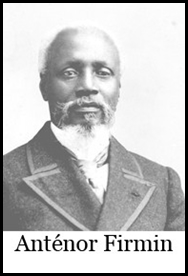 Born in Cap-Haitian on October 18, 1850 to a family of modest means, Joseph Auguste Anténor Firmin was a scholar, public servant and politician who left behind a vast collection of literary work in which he delved into patriotism, civic participation, moral leadership and other important political and philosophical questions about good governance. His unparalleled and enlightened body of work is still considered relevant today, particularly as an example for the young generation of Haitians who will shape the future of our nation.
Born in Cap-Haitian on October 18, 1850 to a family of modest means, Joseph Auguste Anténor Firmin was a scholar, public servant and politician who left behind a vast collection of literary work in which he delved into patriotism, civic participation, moral leadership and other important political and philosophical questions about good governance. His unparalleled and enlightened body of work is still considered relevant today, particularly as an example for the young generation of Haitians who will shape the future of our nation.
Firmin was an assiduous student who himself started teaching at age 17. After studying accounting, he was employed at the Haitian Customs Office, and then as a clerk for a private business. He then left the private sector to teach Greek, Latin and French. His interest in politics and in the Liberal Party led him to start a newspaper, “Le Messager du Nord,” in which his great sensitivity to the question of color was reflected in his articles. After an unsuccessful run for the Parliament in 1879, he was asked to represent Haiti at the Bolivar Centennial Celebration in Caracas, Venezuela. He later refused a position at a government ministry and left for St. Thomas and then Paris, where he became a member of the “Société d’Anthropologie.”
In 1885, Firmin published “De l’Egalité des Races Humaines” (Of the Equality of the Human Races) as a rebuttal to the thesis presented by French writer Count Arthur de Gobineau in his “Essai sur l’Inégalité des Races Humaines” (On the Inequality of Human Races). This piece is considered a seminal work of Haitian scholarship.
Following Firmin’s return to Haiti, President Louis Mondestin Florvil Hyppolite appointed him Minister of Finance and External Relations in 1889; an office he held until 1891. He distinguished himself by his competence, his behavior and his integrity. During his tenure, he reorganized the administration and reestablished a climate of trust, which led to the country’s economic recovery. In addition, he deftly resisted the pressures exerted by the American government to establish a military base at Môle Saint-Nicolas.
Firmin is remembered for his political intelligence, exceptional sense of civic responsibility, and administrative integrity.

